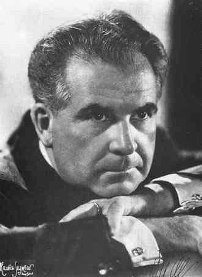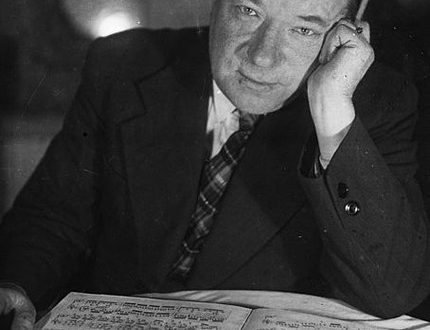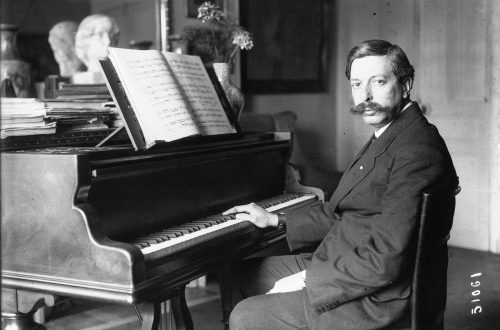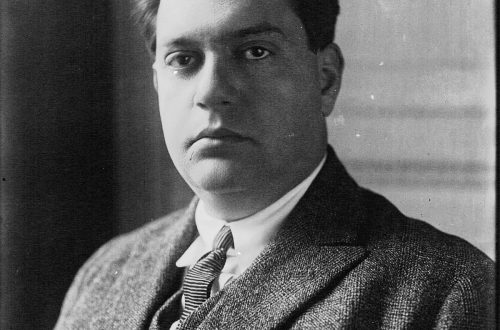
André Jolivet |
André Jolivet

I want to return music to its original ancient meaning, when it was an expression of the magical and incantatory principle of religion that unites people. A. Zholyve
The modern French composer A. Jolivet said that he strives to “be a real universal man, a man of space.” He treated music as a magical force that magically affects people. To enhance this impact, Jolivet was constantly looking for unusual timbre combinations. These could be exotic modes and rhythms of the peoples of Africa, Asia and Oceania, sonorous effects (when the sound affects its color without a clear distinction between individual tones) and other techniques.
Jolivet’s name appeared on the musical horizon in the mid-30s, when he performed as a member of the Young France group (1936), which also included O. Messiaen, I. Baudrier and D. Lesure. These composers called for the creation of “live music” full of “spiritual warmth”, they dreamed of a “new humanism” and “new romanticism” (which was a kind of reaction to the fascination with constructivism in the 20s). In 1939, the community broke up, and each of its members went his own way, remaining faithful to the ideals of youth. Jolivet was born into a musical family (his mother was a good pianist). He studied the basics of composition with P. Le Flem, and then – with E. Varèse (1929-33) in instrumentation. From Varèse, the ancestor of sonor and electronic music, Jolivet’s penchant for colorful sound experiments in many respects. At the beginning of his career as a composer, Jolivet was in the grip of the idea of ”knowing the essence of the” incantatory magic “of music.” This is how the cycle of piano pieces “Mana” (1935) appeared. The word “mana” in one of the African languages means a mysterious force that lives in things. This line was continued by “Incantations” for flute solo, “Ritual Dances” for orchestra, “Symphony of Dances and Delphic Suite” for brass, Martenot waves, harp and percussion. Jolivet often used Martenot waves – invented in the 20s. an electric musical instrument that produces smooth, like unearthly sounds.
During the Second World War, Jolivet was mobilized and spent about a year and a half in the army. The impressions of the wartime resulted in “Three complaints of a soldier” – a chamber vocal work on his own poems (Jolivet had an excellent literary talent and even hesitated in his youth which of the arts to give preference to). 40s – a time of change in the style of Jolivet. The First Piano Sonata (1945), dedicated to the Hungarian composer B. Bartok, differs from the early “spells” in energy and clarity of rhythm. The circle of genres is expanding here and the opera (“Dolores, or the Miracle of the Ugly Woman”), and 4 ballets. The best of them, “Guignol and Pandora” (1944), resurrects the spirit of farcical puppet performances. Jolivet writes 3 symphonies, orchestral suites (“Transoceanic” and “French”), but his favorite genre in the 40-60s. was a concert. The list of solo instruments in Jolivet’s concertos alone speaks of the tireless search for timbre expressiveness. Jolivet wrote his first concerto for waves by Martenot and orchestra (1947). This was followed by concertos for trumpet (2), flute, piano, harp, bassoon, cello (the Second Cello Concerto is dedicated to M. Rostropovich). There is even a concert where percussion instruments solo! In the Second Concerto for trumpet and orchestra, jazz intonations are heard, and in the piano concerto, along with jazz, echoes of African and Polynesian music are heard. Many French composers (C. Debussy, A. Roussel, O. Messiaen) looked to exotic cultures. But it is unlikely that anyone can compare with Jolivet in the constancy of this interest, it is quite possible to call him “Gauguin in music.”
Jolivet’s activities as a musician are very diverse. For a long time (1945-59) he was musical director of the Paris theater Comedie Francaise; over the years he created music for 13 performances (among them “The Imaginary Sick” by J. B. Moliere, “Iphigenia in Aulis” by Euripides). As a conductor, Jolivet performed in many countries of the world and repeatedly visited the USSR. His literary talent manifested itself in a book about L. Beethoven (1955); constantly striving to communicate with the public, Jolivet acted as a lecturer and journalist, was the main consultant on musical issues at the French Ministry of Culture.
In the last years of his life, Jolivet devoted himself to pedagogy. Since 1966 and until the end of his days, the composer holds the position of professor at the Paris Conservatory, where he teaches a composition class.
Speaking about music and its magical impact, Jolivet focuses on communication, a sense of unity between people and the entire universe: “Music is primarily an act of communication… Communication between the composer and nature… at the moment of creating a work, and then communication between the composer and the public at the moment of performance works”. The composer managed to achieve such unity in one of his largest works – the oratorio “The Truth about Jeanne”. It was performed for the first time in 1956 (500 years after the trial that acquitted Joan of Arc) in the homeland of the heroine – in the village of Domremy. Jolivet used the texts of the protocols of this process, as well as poems by medieval poets (including Charles of Orleans). The oratorio was performed not in a concert hall, but in the open air, in the presence of several thousand people.
K. Zenkin





